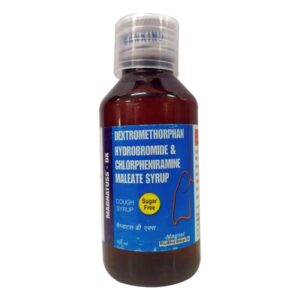DEXTROMETHORPHAN + CHLORPHENARAMINE MALEATE
Dextromethorphan: Dextromethorphan is a medication commonly used as a cough suppressant. It is classified as an antitussive and is available over-the-counter in many countries.
Dextromethorphan works by acting on the cough center in the brain to decrease the urge to cough. It acts as an NMDA receptor antagonist, which helps reduce the transmission of cough signals.
The dose of dextromethorphan varies depending on the formulation and the individual’s age. For adults, the typical recommended dose is 10-20 mg every 4-6 hours, not to exceed 120 mg in 24 hours. For children, the dose is based on weight, typically ranging from 1-2.5 mg per kilogram of body weight per dose.
Some common side effects of dextromethorphan include dizziness, drowsiness, nausea, and stomach upset. In some cases, it can cause more serious side effects such as serotonin syndrome, especially when used in combination with certain other medications. Serotonin syndrome symptoms may include agitation, hallucinations, rapid heartbeat, fever, muscle stiffness, tremors, and loss of coordination. It is important to be cautious when combining dextromethorphan with antidepressants or other serotonergic medications.
Dextromethorphan should not be used in individuals with a known hypersensitivity to the drug or in those who have a persistent cough due to smoking, asthma, chronic bronchitis, or emphysema, unless directed by a healthcare professional.
As with any medication, it is essential to read and follow the instructions provided by the manufacturer or consult with a healthcare professional for proper use and dosing.
Chlorphenaramine Maleate: Chlorpheniramine Maleate is an antihistamine medication. It is primarily used to relieve symptoms of allergies such as sneezing, runny nose, itching, and watery eyes. It can also be used to alleviate symptoms of the common cold, hay fever, and other respiratory allergies.
The drug works by blocking the action of histamine, which is a chemical released by the body during an allergic reaction. By blocking histamine, it helps to reduce or prevent the symptoms associated with allergies.
Chlorpheniramine Maleate is available in various forms, including tablets, capsules, syrups, and injections. The recommended dose will depend on factors such as the individual’s age, weight, and the severity of their symptoms. It is important to follow the instructions provided by the healthcare professional or those mentioned on the packaging.
Common side effects of Chlorpheniramine Maleate may include drowsiness, dizziness, dry mouth, blurred vision, constipation, and urinary retention. These side effects are generally mild and do not require medical attention, but if they persist or worsen, it is advisable to consult a healthcare professional.
In some cases, Chlorpheniramine Maleate may cause more serious side effects such as confusion, hallucinations, rapid or irregular heartbeat, difficulty urinating, or severe dizziness. If any of these symptoms occur, it is important to seek immediate medical attention.
It is worth noting that Chlorpheniramine Maleate may interact with other medications, including sedatives, tranquilizers, and drugs that cause drowsiness. Therefore, it is important to inform the healthcare professional about any other medications or supplements being taken.
Overall, Chlorpheniramine Maleate is an effective antihistamine medication used to relieve symptoms of allergies. However, it is important to use it as directed and be aware of its potential side effects.

